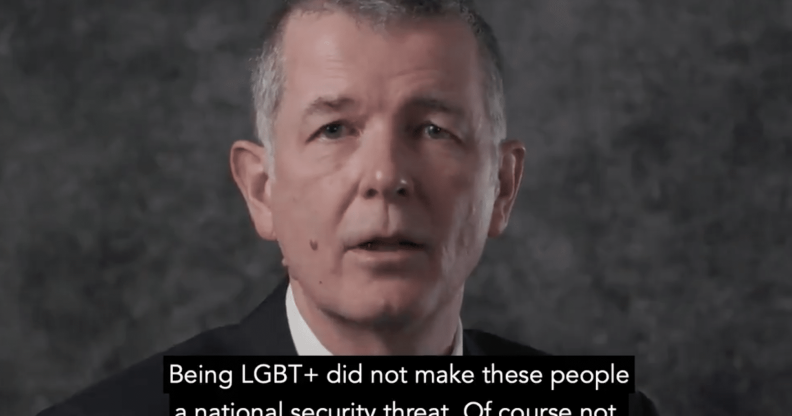MI6 chief apologises for historic ban on LGBT+ spies that said being queer was a ‘national security threat’

Chief of the UK Secret Intelligence Service Richard Moore released a video apology on 19 February (Twitter)
The chief of MI6 has finally apologised for a historic ban on LGBT+ people in the secret service after their sexuality was deemed a “national security threat”.
Until 1991 the UK’s covert foreign intelligence service refused to allow LGBT+ people in its ranks because of the misguided view that they would be more susceptible to blackmail than straight people.
MI6 apologised for this discriminatory policy for the first time on Friday (19 February), admitting that “secret does not mean unaccountable”.
“Committed, talented, public-spirited people had their careers and lives blighted because it was argued that being LGBT+ was incompatible with being an intelligence professional,” said Richard Moore, chief of the Secret Intelligence Service.
“Because of this policy, other loyal and patriotic people had their dreams of serving their country in MI6 shattered. This was wrong, unjust and discriminatory.
“Today, I apologise on behalf of MI6 for the way our LGBT+ colleagues and fellow citizens were treated and express my regret to those whose lives were affected.”
Marking the 30 year anniversary of lifting the vetting bar to LGBT+ employees in intelligence agencies in 1991, I apologise on behalf of #MI6 for the way LGBT+ colleagues and fellow citizens were treated, and express my regret for everyone whose life was affected #LGBTHM21 pic.twitter.com/bLsnNeY8RJ
— Richard Moore (@ChiefMI6) February 19, 2021
The ban on LGBT+ people in the civil and diplomatic services was lifted 30 years ago by prime minister John Major. Before this point MI6 routinely refused LGBT+ recruits on entry, while any officers or agents who were discovered to be queer were instantly fired.
The MI6 chief took full responsibility for the harm these actions caused and acknowledged the painful legacy it left behind in the decades that followed.
“Being LGBT+ did not make these people a national security threat. Of course not,” Moore said. “But the ban did mean that we, in the intelligence and diplomatic services, deprived ourselves of some of the best talent Britain could offer. Ready to serve but denied that opportunity.
“Even after the ban was lifted in 1991, its effects lingered. Some staff who chose to come out were treated badly for not having previously disclosed their sexuality during their security vetting. Others who joined in the period post-1991 were made to feel unwelcome.
“That treatment fuelled a reluctance to be their true selves in the workplace. This was also unacceptable.”
The long-awaited apology follows those made by GCHQ in 2016 and MI5 in 2020, which marked a welcome turning point as the UK’s intelligence services finally acknowledged their part in excluding LGBT+ people from public life.
Moore, who was appointed to the top role in October 2020, sought to highlight the progress MI6 made in the years since the ban.
He paid tribute to his LGBT+ colleagues “who slowly turned the tide” by educating others and fighting for change; thanks to their efforts MI6 has been ranked among the top 100 employers in Stonewall’s Workplace Equality Index every year since 2016.
“We still have more to do to become a fully inclusive employer, and my goal for MI6 is to make it a workplace where you can always bring your true self to work,” Moore continued.
“MI6 is open to people from all backgrounds, races, ages, sexualities, and all ways of thinking. Diversity makes us more effective; inclusion makes us stronger.”

